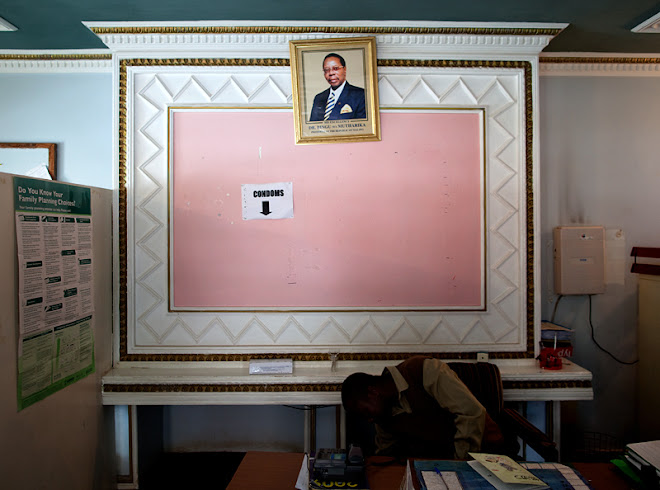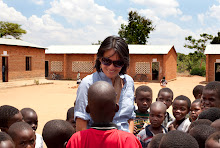Entrance at the FPAM office is a great introduction to our study subject. The first thing we see entering the building is a big portrait on the back wall. It is of the president, Dr. Mutharika. Next to his portrait an A4 paper stating condoms is prominently displayed indicating a box full of condoms.
Mrs Pelekamovo talks passionately about the involvement of man in reproductive health matters, having them take responsibility. In having the men in the delivery room, first of all supporting their wives giving birth, but also experiencing the agony women have to go through giving birth. To make him understand that no woman should give birth to 12 children.
As progressive as we Europeans think ourselves to be on sexuality issues, none of us knows any office with a condom dispenser at the entrance.
Today mainly consist of an introduction to Sexual and Reproductive Health and some Rights, even though it seems to me that the rights are not always thought of to be as important.
Today mainly consist of an introduction to Sexual and Reproductive Health and some Rights, even though it seems to me that the rights are not always thought of to be as important.
We are welcomed by Mathias, the director of programs. After welcoming us to he starts out explaining about achievements and challenges of FPAM. His presentation gives us some insight on how things work in Malawi. The bereaucracy they have to go through to have programs and interventions accepted at community level. There is the ministry of health to deal with, but also the district authorities as well as the traditional authorities. Fortunately most of the time these authorities work side by side in fighting maternal mortality.
The five A’s of the FPAM approach are explained to us; Adolescent programs, Access to Reproductive Health services, HIV AIDS, Post Abortion care and Advocacy.
The journalist fire many questions at Mathias during the presentation, which are answered gladly. Due to all those questions and a tide schedule, Mathias can’t finish his presentation, leaving the team with lots of questions.
The five A’s of the FPAM approach are explained to us; Adolescent programs, Access to Reproductive Health services, HIV AIDS, Post Abortion care and Advocacy.
The journalist fire many questions at Mathias during the presentation, which are answered gladly. Due to all those questions and a tide schedule, Mathias can’t finish his presentation, leaving the team with lots of questions.
Mrs Effie Pelekamovo, E.D. of FPAM, is the next in row to welcome us. We get invited into her small office at the back of the building. Her desk is covered with all sorts of reports. Big piles behind which she can almost fully disappear. Our facilitator John Bonga, one of the Unite For Body Rights program worker, runs out to get some plastic seats to accommodate all guests into the cramped room.
Fortunately the E.D. can fill some of the gaps Mathias left us with after rushing to his next appointment. She answers several more questions of the journalists. On the likeliness of pregnant women attending skilled birth attendants. On the approach of males in the matter of reproductive health. Especially men in rural areas, as the questioning journalist expect there to be more illiteracy and machismo among those men.
Fortunately the E.D. can fill some of the gaps Mathias left us with after rushing to his next appointment. She answers several more questions of the journalists. On the likeliness of pregnant women attending skilled birth attendants. On the approach of males in the matter of reproductive health. Especially men in rural areas, as the questioning journalist expect there to be more illiteracy and machismo among those men.
Mrs Pelekamovo talks passionately about the involvement of man in reproductive health matters, having them take responsibility. In having the men in the delivery room, first of all supporting their wives giving birth, but also experiencing the agony women have to go through giving birth. To make him understand that no woman should give birth to 12 children.
In the afternoon we visit the Reproductive Health Unit from the ministry of health. Deputy director Mrs Kachare welcomes us. I am told it is very uncommon to have an appointment at the ministry. We are lucky and because of that even more happy she accepted our request to meet with us.
Mrs Kachare offers us the opportunity to ask questions the journalists are eager to get answers to. One of the topics we address is the challenge of unwanted pregnancies and the high number of illegal abortion, a major cause of maternal mortality. She kindly offers us a report about the findings of the study on the magnitude of unsafe abortion conducted nationally. The report was launched in June 2009.
Mrs Kachare offers us the opportunity to ask questions the journalists are eager to get answers to. One of the topics we address is the challenge of unwanted pregnancies and the high number of illegal abortion, a major cause of maternal mortality. She kindly offers us a report about the findings of the study on the magnitude of unsafe abortion conducted nationally. The report was launched in June 2009.
The first day of the tour Is not a day in the field. Despite this it turns out to be an interesting day with lots of information to absorb and reminisce over.

